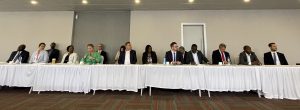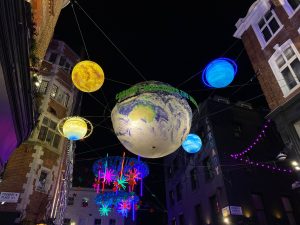HANS STOISSER
Bright spots against a fragmenting world

This is my first blog post in five months. Air travel and our Learning Journeys to African countries are still capped. Instead of flying to Kenya, Rwanda or Senegal, I spend a good 80% of my time in virtual meetings in Austria with Germany. A “new normality” is not yet in sight.
At the beginning of the lockdown my assessment was predominantly positive (16 March 2020).
Reinforcing a fragmenting world
Not that I see the situation completely differently now. But today the troubles on the ground are visible. And we are at the very beginning.
The physical exchange with African countries is still very reduced. Here and there someone flies to Cameroon or comes back from Rwanda. But travelling is still very limited. Above all, hardly any new projects are started, many existing ones are frozen. Companies postpone investments, not only because collaboration with African countries has become more complicated and more uncertain. It is also because many companies are facing major and sometimes existential problems at home.
These mutually reinforcing problems paralyse economic activity at the micro-level and break up systems that had worked well.
Added to this is the separation and decoupling that has existed for some time at the macro level. BREXIT, a US government as a pioneer of protectionism, or the attempt to “decouple” China’s economic activities.
The pandemic acts like a burning glass. The slowdown in economic activity has reinforced global trends towards a fragmenting world.
The shaping of the interlinked global digital society
This means our struggle is not only about overcoming the pandemic. The overarching theme remains the shaping of the interlinked global digital society.
The pandemic is accelerating the dissolution of long-established institutions of industrial society: the fixed job with its fixed working hours at a fixed location, the banking system that gives loans to real-economy companies, state currency systems that base their credibility on the economic power of their economic area.
But new arrangements are not yet in place or are not yet working. Effective institutions that set the framework for a global environmental and fiscal policy? Digital business models for the masses? Social systems for small digital entrepreneurs? Meaningful work on a broad level?
In this phase of uncertainty, it comes as no surprise that system critique is becoming mainstream and is giving a boost to anti-democratic populists. In addition, irrational philosophies and conspiracy theories are springing up. The protest against corona restrictions is merely the hook.
And our cooperation with Africa?
Our cooperation with Africa is currently in the process of becoming a different one. We still think that when the pandemic is over, everything will restart again. I don’t think it will happen like that. There will not be an abrupt end to the pandemic. Many of the restrictions will only slowly fade away and we will only slowly start projects again. However, many things will not fall back into its place again the way they were.
In Kenya, Mozambique or Ghana, people who have moved to their families will migrate from the villages back to the cities. International salespeople and project developers will reappear in African capitals.
But they will all have a different mindset. There will be an awareness that work and income cannot be taken for granted, that international economic relations are fragile and that there are now completely different ways of collaborating.
Of those who can afford it, some will question the purpose of their jobs and the way they work. They will increasingly strive to solve real problems and will increasingly resort to digital technologies.
And they will see the big picture again more often. It will be about ideas and innovations for broad-based prosperity, for a sustainable energy supply, for a new mobility system, for a fair way of transforming our world.
For this we need open systems and more global exchange and interconnecting.
Exchange and interconnecting in the digital age
The troubles on the ground to end the pandemic and to successfully transform into the digital society seem enormous. The current trends towards fragmenting the world seem almost insurmountable. Therefore, in my work with Africa, I want to focus on the bright spots of globalization that will bring more exchange and interconnectedness into a sustainable digital age.
One of the bright spots of a new globalization is Code of Africa, look up here:
Code of Africa – new forms of collaboration



